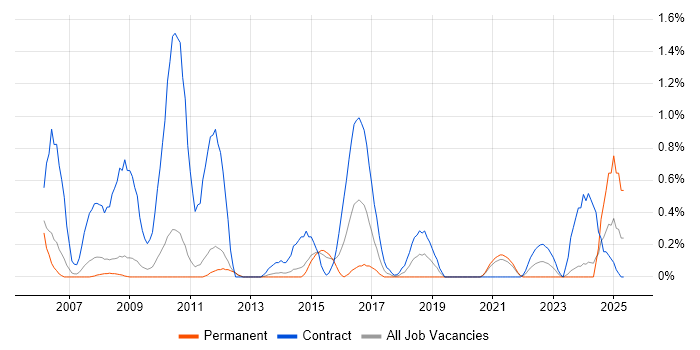EMC Symmetrix Remote Data Facility (SRDF)
South Yorkshire > Sheffield
The table below provides summary statistics for permanent job vacancies advertised in Sheffield requiring SRDF skills. It includes a benchmarking guide to the annual salaries offered in vacancies that cited SRDF over the 6 months leading up to 31 May 2025, comparing them to the same period in the previous two years.
| 6 months to 31 May 2025 |
Same period 2024 | Same period 2023 | |
|---|---|---|---|
| Rank | 39 | - | - |
| Rank change year-on-year | - | - | - |
| Permanent jobs citing SRDF | 2 | 0 | 0 |
| As % of all permanent jobs advertised in Sheffield | 0.70% | - | - |
| As % of the System Software category | 3.33% | - | - |
| Number of salaries quoted | 0 | 0 | 0 |
| Median annual salary (50th Percentile) | - | - | - |
| South Yorkshire median annual salary | - | - | - |
All System Software Skills
Sheffield
SRDF falls under the System Software category. For comparison with the information above, the following table provides summary statistics for all permanent job vacancies requiring system software skills in Sheffield.
| Permanent vacancies with a requirement for system software skills | 60 | 151 | 152 |
| As % of all permanent jobs advertised in Sheffield | 21.13% | 12.87% | 17.35% |
| Number of salaries quoted | 46 | 118 | 99 |
| 10th Percentile | £26,000 | £26,275 | £20,000 |
| 25th Percentile | £28,250 | £30,094 | £24,575 |
| Median annual salary (50th Percentile) | £32,500 | £42,500 | £32,200 |
| Median % change year-on-year | -23.53% | +31.99% | -38.67% |
| 75th Percentile | £35,000 | £51,250 | £48,750 |
| 90th Percentile | £53,250 | £62,500 | £74,000 |
| South Yorkshire median annual salary | £32,500 | £40,000 | £35,000 |
| % change year-on-year | -18.75% | +14.29% | -33.33% |
SRDF
Job Vacancy Trend in Sheffield
Job postings citing SRDF as a proportion of all IT jobs advertised in Sheffield.

SRDF
Co-occurring Skills and Capabilities in Sheffield by Category
The follow tables expand on the table above by listing co-occurrences grouped by category. The same employment type, locality and period is covered with up to 20 co-occurrences shown in each of the following categories:
|
|
|||||||||||||||||||||||||||||||||||||||||||||
|
|
|||||||||||||||||||||||||||||||||||||||||||||
|
|
|||||||||||||||||||||||||||||||||||||||||||||
|
|
|||||||||||||||||||||||||||||||||||||||||||||
|
|
|||||||||||||||||||||||||||||||||||||||||||||
|
|
|||||||||||||||||||||||||||||||||||||||||||||
|
|
|||||||||||||||||||||||||||||||||||||||||||||
